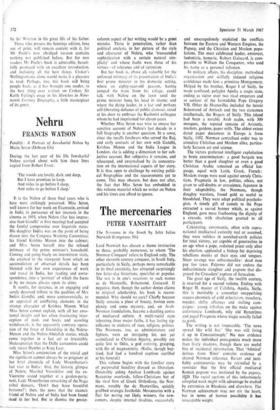Nehru
FRANCIS WATSON
Panditji el Portrait of Jawaharlal Nehru by Marie Seton (Dobson 63s)
During the last year of his life Jawaharlal' Nehru carried about with him these lines copied from Robert Frost: 'The woods are lovely, dark and deep, But I have promises to keep, And miles to go before I sleep, And miles to go before I sleep.'
It is the Nehru of those final years who is here most strikingly preserved. Miss Seton, well known for her work on Eisenstein, arrived in India in pursuance of her interests in the cinema in 1955, when Nehru ('far less impres-. sive than Gandhi' at first meeting) had accepted the fateful compromise over linguistic states. His daughter Indira was on the point of being drawn into the Congress Working Committee; his friend Krishna Menon into the cabinet; and Miss Seton herself into the relaxed intimacy of the prime minister's household. Coming and going freely on intermittent visits, she attained to the viewpoint from which an accumulation of observed details has been blended with her own experiences of work and travel in India, her reading and corre- spondence, into a 'portrait' of which the focus is by no means always upon its sitter.
It results, for instance, in ,an engaging and surely deserved tribute to the qualities of Mrs Indira Gandhi; and, more controversially, to an appraisal of conflicting elements in the strange character of Krishna Menon. What Miss Seton cannot explain, with all her emo- tional insight and her often fascinating inter- ception of nods and becks and scowling withdrawals, is the apparently contrary opera- tion of the force of friendship in the Nehru- Menon and the Nehru-Abdullah stories, which come together in a last act so irresistibly Shakespearian that the Delhi cartoonists could only recast Hamlet as King Lear.
Miss Seton's conjunction of the trivial apd the significant cannot always be so poignant A her brief chronicle of Lady Mountbatten's last visit to India: first, the historic glimpse of Nehru, Marshal Voroshilov and the ex- Vicereine seated together at a garden-party; next, Lady Mountbatten remarking of the Naga tribal dancers, 'Don't they have beautiful bottoms?'; then, the news that the staunch friend of Nehru and of India had been found dead in her bed. But to dismiss the gossip-
column aspect of her writing would be a great mistake. There is penetration, rather than political analysis, in her picture of the style and character of Nehru, who 'transcended sophistication with a certain natural sim- plicity' and whose faults were those of his virtues—of tolerance and of optimism.
But her book is, above all, valuable for the unforced intimacy of its presentation of India's first prime minister in his domestic setting, where an eighty-year-old peasant, having jumped the train from his village, could talk with Nehru on the lawn until the prime minister hung his head in shame; and where the dying leader, in a last and perhaps self-liberating defiance of public clamour, stood at his door to embrace the Kashmiri colleague whom he had imprisoned for eleven years.
Whether Miss Seton was wise to encase her sensitive account of Nehru's last decade in a full biography is another question. In a sense, since she recalls forebears who served the Raj, and early contacts of her own with Gandhi, Krishna Menon and the India League in London, she is adding a dimension to her sub- jective account. But subjective it remains, and telescoped, and externalised by its concentra- tion on the international aspects of her story. It is thus open to challenge by existing politi- cal biographies and the reassessments yet to come. This may obscure, but does not alter, the fact that Miss Seton has embedded in this volume material which no writer on Nehru and his times can afford to ignore.






























 Previous page
Previous page